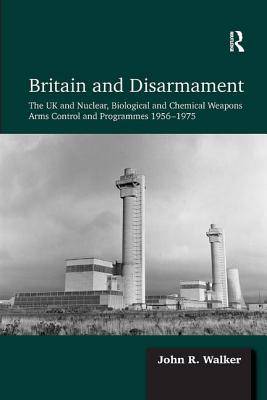
- Afhalen na 1 uur in een winkel met voorraad
- Gratis thuislevering in België vanaf € 30
- Ruim aanbod met 7 miljoen producten
- Afhalen na 1 uur in een winkel met voorraad
- Gratis thuislevering in België vanaf € 30
- Ruim aanbod met 7 miljoen producten
Zoeken
Britain and Disarmament
The UK and Nuclear, Biological and Chemical Weapons Arms Control and Programmes 1956-1975
John R Walker
Hardcover | Engels
€ 202,95
+ 405 punten
Uitvoering
Omschrijving
Since the use of poison gas during the First World War and the dropping of atomic bombs on Japan at the end of the Second World War, nuclear, biological or chemical (NBC) weapons have registered high on the fears of governments and individuals alike. Recognising both the particular horror of these weapons, and their potential for inflicting mass death and destruction, much effort has been expended in finding ways to eliminate such weapons on a multi-lateral level. Based on extensive official archives, this book looks at how successive British governments approached the subject of control and disarmament between 1956 and 1975. This period reflects the UK's landmark decision in 1956 to abandon its offensive chemical weapons programme (a decision that was reversed in 1963, but never fully implemented), and ends with the internal travails over the possible use of CR (tear gas) in Northern Ireland. Whilst the issue of nuclear arms control has been much debated, the integration of biological and chemical weapons into the wider disarmament picture is much less well understood, there being no clear statement by the UK authorities for much of the period under review in this book as to whether the country even possessed such weapons or had an active research and development programme. Through a thorough exploration of government records the book addresses fundamental questions relating to the history of NBC weapons programmes, including the military, economic and political pressures that influenced policy; the degree to which the UK was a reluctant or enthusiastic player on the international arms control stage; and the effect of international agreements on Britain's weapons programmes. In exploring these issues, the study provides the first attempt to assess UK NBC arms control policy and practice during the Cold War.
Specificaties
Betrokkenen
- Auteur(s):
- Uitgeverij:
Inhoud
- Aantal bladzijden:
- 322
- Taal:
- Engels
Eigenschappen
- Productcode (EAN):
- 9781409435808
- Verschijningsdatum:
- 28/01/2012
- Uitvoering:
- Hardcover
- Formaat:
- Genaaid
- Afmetingen:
- 156 mm x 233 mm
- Gewicht:
- 452 g

Alleen bij Standaard Boekhandel
+ 405 punten op je klantenkaart van Standaard Boekhandel
Beoordelingen
We publiceren alleen reviews die voldoen aan de voorwaarden voor reviews. Bekijk onze voorwaarden voor reviews.












